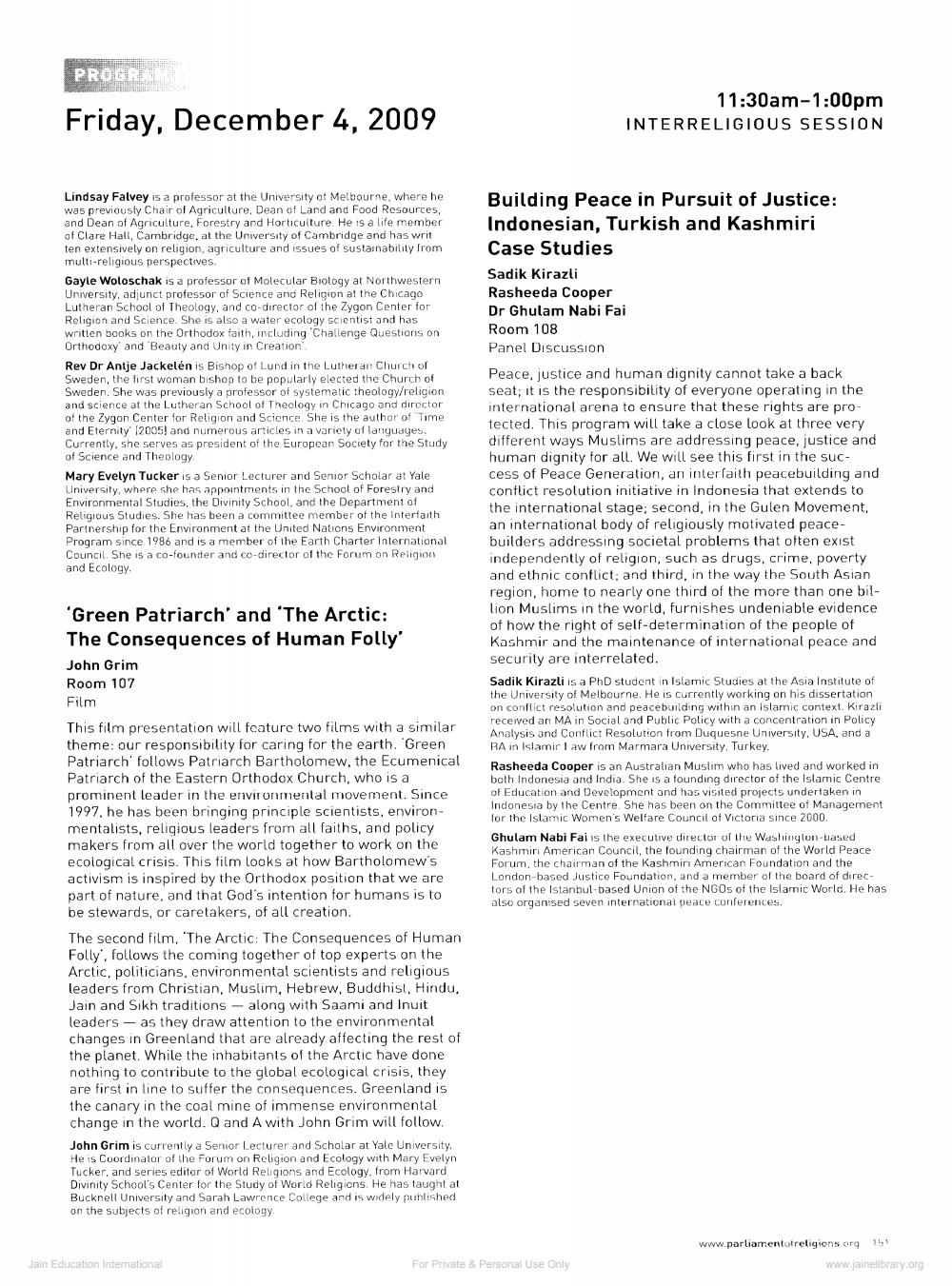________________
PRO
Friday, December 4, 2009
11:30am-1:00pm INTERRELIGIOUS SESSION
Lindsay Falvey is a professor at the University of Melbourne, where he was previously Chair of Agriculture, Dean of Land and Food Resources, and Dean of Agriculture, Forestry and Horticulture. He is a life member of Clare Hall, Cambridge, at the University of Cambridge and has writ ten extensively on religion, agriculture and issues of sustainability from multi-religious perspectives. Gayle Woloschak is a professor of Molecular Biology at Northwestern University, adjunct professor of Science and Religion at the Chicago Lutheran School of Theology, and co-director of the Zygon Center for Religion and Science. She is also a water ecology Scientist and has written books on the Orthodox faith, including Challenge Questions on Orthodoxy and Beauty and Unity in Creation Rev Dr Antje Jackelén is Bishop of Lund in the Lutheran Church of Sweden, the first woman bishop to be popularly elected the Church of Sweden. She was previously a professor of systematic theology/religion and science at the Lutheran School of Theology in Chicago and director of the Zygon Center for Religion and Science. She is the author of Time and Eternity (2005) and numerous articles in a variety of languages. Currently, she serves as president of the European Society for the Study of Science and Theology Mary Evelyn Tucker is a Senior Lecturer and Senior Scholar at Yale University, where she has appointments in the School of Forestry and Environmental Studies, the Divinity School, and the Department of Religious Studies. She has been a committee member of the Interfaith Partnership for the Environment at the United Nations Environment Program since 1986 and is a member of the Earth Charter International Council. She is a co-founder and co-director of the Forum on Religion and Ecology
Building Peace in Pursuit of Justice: Indonesian, Turkish and Kashmiri Case Studies Sadik Kirazli Rasheeda Cooper Dr Ghulam Nabi Fai Room 108 Panel Discussion Peace, justice and human dignity cannot take a back seat; it is the responsibility of everyone operating in the international arena to ensure that these rights are protected. This program will take a close look at three very different ways Muslims are addressing peace, justice and human dignity for all. We will see this first in the success of Peace Generation, an interfaith peacebuilding and conflict resolution initiative in Indonesia that extends to the international stage, second, in the Gulen Movement, an international body of religiously motivated peacebuilders addressing societal problems that often exist independently of religion, such as drugs, crime, poverty and ethnic conflict; and third, in the way the South Asian region, home to nearly one third of the more than one billion Muslims in the world, furnishes undeniable evidence of how the right of self-determination of the people of Kashmir and the maintenance of international peace and security are interrelated. Sadik Kirazli is a PhD student in Islamic Studies at the Asia Institute of the University of Melbourne. He is currently working on his dissertation on conflict resolution and peacebuilding within an Islamic context. Kirazli received an MA in Social and Public Policy with a concentration in Policy Analysis and Conflict Resolution from Duquesne University, USA, and a BA in Islamir I aw from Marmara University, Turkey. Rasheeda Cooper is an Australian Muslim who has lived and worked in both Indonesia and India. She is a founding director of the Islamic Centre of Education and Development and has visited projects undertaken in Indonesia by the Centre. She has been on the Committee of Management for the Islamic Women's Welfare Council of Victoria since 2000 Ghulam Nabi Fai is the executive director of the Washington-based Kashmiri American Council, the founding chairman of the World Peace Forum, the chairman of the Kashmiri American Foundation and the London-based Justice Foundation, and a member of the board of directors of the Istanbul-based Union of the NGOs of the Islamic World. He has also organised seven international peace conferences.
'Green Patriarch' and 'The Arctic: The Consequences of Human Folly' John Grim Room 107 Film
This film presentation will feature two films with a similar theme: our responsibility for caring for the earth. 'Green Patriarch' follows Patriarch Bartholomew, the Ecumenical Patriarch of the Eastern Orthodox Church, who is a prominent leader in the environmental movement. Since 1997, he has been bringing principle scientists, environmentalists, religious leaders from all faiths, and policy makers from all over the world together to work on the ecological crisis. This film looks at how Bartholomew's activism is inspired by the Orthodox position that we are part of nature, and that God's intention for humans is to be stewards, or caretakers, of all creation. The second film, 'The Arctic: The Consequences of Human Folly, follows the coming together of top experts on the Arctic, politicians, environmental scientists and religious leaders from Christian, Muslim, Hebrew, Buddhist, Hindu. Jain and Sikh traditions - along with Saami and Inuit leaders - as they draw attention to the environmental changes in Greenland that are already affecting the rest of the planet. While the inhabitants of the Arctic have done nothing to contribute to the global ecological crisis, they are first in line to suffer the consequences. Greenland is the canary in the coal mine of immense environmental change in the world. Q and A with John Grim will follow. John Grim is currently a Senior Lecturer and Scholar at Yale University. He is Coordinator of the Forum on Religion and Ecology with Mary Evelyn Tucker, and series editor of World Religions and Ecology, from Harvard Divinity School's Center for the Study of World Religions. He has taught at Bucknell University and Sarah Lawrence College and is widely published on the subjects of religion and ecology
www.parliamento religions.org 151
www.jainelibrary.org
Jain Education International
For Private & Personal Use Only




